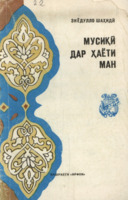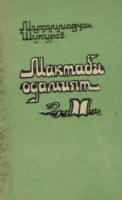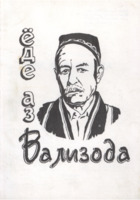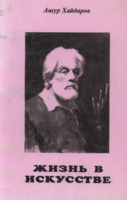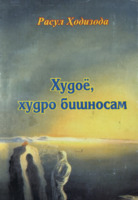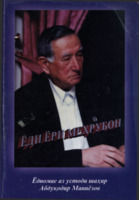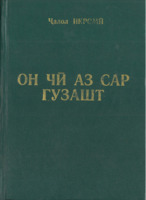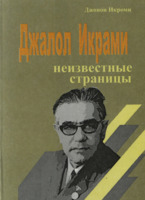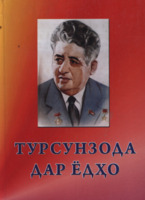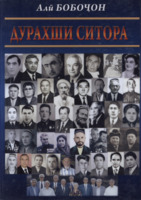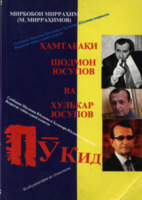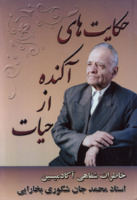Browse Documents (12 total)
Мусиқӣ дар ҳаёти ман Music in my life
From the publisher: Китоби «Мусиқӣ дар ҳаёти ман» доир ба мафҳуми мусиқӣ, таъсиру хосиятҳои он, роҷеъ ба фаъолияти бастакорони тоҷик ва марҳилаҳои инкишофи он маълумот медиҳад.
Ziyodullo Shahidi (1914-1985) was a Tajik musician, conductor, and composer. Originally trained in the Maqom tradition, Shahidi was recruited to the Moscow conservatory, where he studied with Aleksandr Lensky, Vladimir Fere, and Sergey Balasanyan - all of whom were involved in the project of "modernizing" indigenous musical traditions across the USSR. The volume collects Shahidi's essays on the music of other composers, as well as accounts of his initial recruitment, studies, work with the poet A. Dehoti, and other episodes from his career.
Ziyodullo Shahidi (1914-1985) was a Tajik musician, conductor, and composer. Originally trained in the Maqom tradition, Shahidi was recruited to the Moscow conservatory, where he studied with Aleksandr Lensky, Vladimir Fere, and Sergey Balasanyan - all of whom were involved in the project of "modernizing" indigenous musical traditions across the USSR. The volume collects Shahidi's essays on the music of other composers, as well as accounts of his initial recruitment, studies, work with the poet A. Dehoti, and other episodes from his career.
Мактаби одамият: Баъзе масъалаҳои адабиёт
ва маънавият.
The School of humaneness: some questions of literature and spirituality
Muhammadjon Shakuri (Shakurov) (1924-2012) was a Tajik philologist and academician. He studied at the pedagogical institute in Dushanbe and later earned his kandidatskaia and doktorskaia degrees at the Institute of World Literature in Moscow. His professional home, however, remained the Rudaki Institute of Language and Literature in Dushanbe. In the late 1980s he became a leading figure in the campaign for the primacy of the Tajik language. This volume collects a number of his articles on the relationship between literature, spirituality, and morality. It also includes several pieces recounting experiences with Sadriddin Ayni, Mirzo Tursonzoda, A. Dehoti, and Mirsaid Mirshakar.
Ёде аз Вализода Memories of Valizoda
From the publisher: Дар китоб ёдномаҳое гирд оварда шудаанд, ки ба калами олимон, шоиру нависандагон, дӯстону наздикони Саидалй Вализода мутааллиқанд. Китоб оммаи хонандагонро ба хислатҳои наҷиби ин адиб ва ҳунарманди халқи тоҷик шинос намуда,, аз мақоми хоси шоир дар таърихи адабиёти шифоҳии халқи тоҷик ва эътирофу қадршиносии мардум иисбат ба фарзанди баруманди халқ нақл мекунад.
Saidali Valizoda (1900-1971) was a Tajik poet, musician, performer, and educator. After working at a theatre in Stalinabad he returned to Hovaling, his home district, in 1938, where he worked at a boarding school (internat). He continued writing and publishing in the decades after the Great Patriotic War. This volume collects recollections about Valizoda and poems written in his honor by writers like Boki Rahimzoda, Jolol Ikramov, Abdusalom Dekhoti, and others.
Saidali Valizoda (1900-1971) was a Tajik poet, musician, performer, and educator. After working at a theatre in Stalinabad he returned to Hovaling, his home district, in 1938, where he worked at a boarding school (internat). He continued writing and publishing in the decades after the Great Patriotic War. This volume collects recollections about Valizoda and poems written in his honor by writers like Boki Rahimzoda, Jolol Ikramov, Abdusalom Dekhoti, and others.
Жизнь в искусстве A Life in Art
Ashur Haydarov (1916-1988) was a Tajik artist. Born in Samarqand, he studied with Pavel Benkov, then went to work at the newspaper Lenin Yuli, where one of his colleagues was future First Secretary of Uzbekistan Sharof Rashidov. After the outbreak of war in 1941, Haydarov volunteered for service and was comissioned as a Second Liutenant. He was taken prisoner but escaped and joined partisan forces, eventually joining an NKVD detachment. After the war in 1949 Haydarov was arrested for supposed collaboration and imprisoned until 1955. He subsequently made a succesful aristic career but was not formally rehabilitated until 1989. The volume includes his (unfinished) memoirs, focusing on his youth, wartime service, and imprisonment, as well as articles from colleagues and friends.
Худое, худро бишиносам To know oneself and to know God
From the publisher: Олим ва нависандаи маъруф Расул Ҳодизода дар китоби хотироташ ҳамзамон бо тасвири марҳилаҳои зиндаги ва фаъолияти худ дар бораи воқеахри таърихии илму маданият ва симохри шинохтаи адабиёт, илм ва фарх,анги тоҷик хркоятхри ҷолиб аз диду дили худ нақл намудааст. Чунонки муаллиф гуфтааст, ин китоб "еде аз саҳифаҳои таърихи замой ва одамон аст", ки 6а хонандаи имруз тақдим мешавад.
Rasul Hodizoda (1928-2010) was a writer, translator, and scholar. Born in Samarkand, he studied in Tashkent, worked briefly in radio, and later did graduate work in Moscow. Hodizoda spent most of his career at the Rudaki Institute in Dushanbe, but was also active in the Union of Writers and published in all-union publications such as Druzhba Narodov. These particularly detailed memoirs cover his childhood, education, and career. Hodizoda also provides detail on his experiences writing a novel about Ahmad Donish and his relationship with mentors like Sadriddin Ayni, Mikhail Andreev, and Aleksandr Semenov, as well as contemporaries like Muhamadjon Shakurov (Shakuri), Shavqat Niezi, Semen Lipkin, and Mikhail Zand.
Ёди Ёри Меҳрубон
(Ёдномае аз устоди шаҳир Абдуқодир Маниёзов)
Memory of a beloved friend (recollections about the great teacher Abduqodir Maniyozov)
From the publisher: Калами донишмандону фархехтагони тоҷик тааллук дорад ва онхо ба шинохам яке аз чехраҳои азиз ва мӯьтабари Тоҷикистон, фарзанди хирадманд, устоди донишманду ровии нотакрор, узви вобастаи Академиям илмхои Ҷумҳури Тоҷикистон, узви пайвасгаи Фарҳангистони забои ва адаби форсим Ҷумхурии Исломии Эрон, сарвари фахрии Пажӯҳишюхи забои ва адабиёги баноми Рӯдакии Академиям илмхои Ҷумхурии Тоҷикистон, раиси Кумитан иҷроияи «Пайванд» Абдукодир Маниёзов бахшида шудаанд. Муаллифон зимни хотирот ва аидепгарони аз бехтарин сифатҳои инсонй ва халокияг, озодкорй ва озодандешии ин озодмарди ҷомеа, чехраи инсонй ва шарофати азалии устоди зиндаёд. кобилияти ташкилогчигии илмй ва хислатҳои огмфаи рохбарй ва шеьршиносиву сухандонии ровии забони тоҷикӣ ёд овардаанд. Ҳамчунин дар китоб аз хотироту ёддошт, таълифот ва тарҷумаи бадей, ки аз шуглхои пайвасгаи устод Абдукодир Маниёзов буданд, ба хонандаи азиз як-ду намуна пешкаш мешавад. «Ёди ёри мехрубои» бо ташаббус ва сарпарастии Сафорати Ҷумҳурии Исломии Эрон дар Ҷумҳурии Тоҷикисгон, шахсан бо дасттирии Сафири Кабири Ҷумхурии Исломии Эрон дар Ҷумхурии Тоҷикистон, ҷаноби окои доктор Алиасгар Амири Шсърдӯст ба нашр расидааст.
Abduqodir Maniyozov (1930-2008) was a Tajik philologist. Maniyozov was among the first graduates of the State University in Stalinabad (Dushanbe); from 1972-2000 he was the Director of the Rudaki Institue of Language and Literature. Maniyozov was also the deputy editor of the Tajik Soviet Encyclopedia. This volume collects reminiscences from colleagues and writers, including Ali Bobojon, Horsheda Otahonova, and Ibrohim Usmonov. It also includes short sketches from Maniezov’s unfinished memoirs, covering his childhood during the Great Patriotic War.
Он чӣ аз саргузашт
The stuff of memoirs
From the publisher: Ин китоби охирини Ҷалол Икромӣ мебошад. Нависанда дар бораи солҳои наврасиаш, хешу табораш, революсияи сосиалистии Бухоро ва сарнагун шудани республикаи сосиалистии Бухоро, тараққиёт ва сабзиши республикаи сосиалистии Тоҷикистон сухан меронад. Саҳифаҳои зиёде ба солҳои мудҳиши 1937-39 бахшида шудааст.
Jalol Ikromi (1909-1993) was one of Soviet Tajikistan's most famous writers. This memoir covers his childhood in Bukhara as well his eventual move to Stalinabad (Dushanbe). A substantial portion of the memoir is devoted to the effect of the great terror on his own family and on the intelligentsia more generally. The final pages contain his reflections on Perestroika and the collapse of the USSR.
Джалол Икрами: Неизвестные страницы Jalol Ikrami: Unknown Pages
Jonon Ikrami (1936-) is a chemist and the son of writer Jalol Ikromi. In these memoirs he recounts episodes from the life of his father, the Tajik author Jalol Ikrami. The memoirs cover the authors’ childhood, the 1937 purges, and Jalol Ikrami’s relationship with other Soviet and Central Asian political and literary figures like Sharaf Rashidov, Habibullo Nazarov, Mukhtar Auezov, Mikhail Zand, and Marietta Shaginyan. The memoirs complement Jalol Ikrami’s own memoirs.
Турсунзода дар ёдҳо Recollections about Tursunzoda
From the publisher: Мунодии сулҳу вассофи Ватан, шоири тавонову мураббии аҳли сухан ва яке аз муборизони фаьоли дӯстии халқхои олам Мирзо Турсунзода бо хислатхои наҷибонаю ашъори рангини хеш дар дили хамватанону хамкаламон абадан маскан гирифтааст. «Турсунзода дар ёдхо» дастагулест аз хотироти адибони бузурги олам ва дӯсзону аҳли қалам, ки ба муносибати 100-солагии ин сухансолори бузург пешкашатон мегардад.
Mirzo Tursunzoda (1911-1977) was a Tajik poet and writer, still recognized as one of the most important figures in 20th century Tajik literature. Many of his poems focused on anti-colonial themes. Tursunzoda held a number of important government posts, including chairman of the Soviet Committee for Solidarity with the Countries of Asia and Africa (SKSSAA), member of the Committee for Peace, chairman of the Union of Writers of the Tajik SSR, and a member of the Central Committee of the Communist Party of the Tajik SSR. This volume collects recollections from dozens of writers and colleagues, including Loiq Sherali, Aleksandr Dzasohov, Iosif Braginskiy, Gulnazar, and Rasul Gamzatov.
Mirzo Tursunzoda (1911-1977) was a Tajik poet and writer, still recognized as one of the most important figures in 20th century Tajik literature. Many of his poems focused on anti-colonial themes. Tursunzoda held a number of important government posts, including chairman of the Soviet Committee for Solidarity with the Countries of Asia and Africa (SKSSAA), member of the Committee for Peace, chairman of the Union of Writers of the Tajik SSR, and a member of the Central Committee of the Communist Party of the Tajik SSR. This volume collects recollections from dozens of writers and colleagues, including Loiq Sherali, Aleksandr Dzasohov, Iosif Braginskiy, Gulnazar, and Rasul Gamzatov.
Дурахши ситора (очерк ва мақолаҳо). Shining stars: sketches and articles
From the publisher: Маҷмӯаро мавзӯъҳое фаро мегирад, ки дар онҳо касбу пешаҳои мухталиф дар мисоли рӯзгору фаъолияти соҳибистеъдодҳо, номварону номбардорони сарзамини аҷдодӣ ба қалам омада, аз як тараф, мутолеонро аз бисёр ҷиҳат ба гузаштаҳои пурифтихорамон мешиносонанд ва аз ҷониби дигар, дастури боэътимоде ҳастанд пайи ҳадафқои шойиста хддоях кардани хонандаи имрӯз.
A collection of the journalist Ali Bobojon's sketches and articles about Tajik artists and writers.
Ҳамтабаки Шодмон Юсупов ва Хулькар Юсупов ПӮКИД.
The Union of Shodmon Yusuf and Khulkar Yusupov has come Undone
From the publisher: Ҳеҷ гоҳ бо чунин дилгарми дар навиштани посухе capгарм нашуда будам, чуноне ки дар як моҳи пас аз Наврӯзи соли 2011. Зеро ҳамин даҳ-понздаҳ соли ахир чандин китоб ва садҳо мақола дар мукобили андеша ва шахсияти Мирбобои Мирраҳим (Мирраҳимов) ба нашр расида, ки аксари онҳо қобили накд ва посух нестанд, аммо дурӯғпароканӣ ва тӯҳматномаи С. Мирзорахматов аз ҷинси дигар аст. Дар мавриди навиштаҳои С. Мирзорахматов метавон танҳо бо ибораи хеле зебои Ибни Ҳуққал (Ҳавқал) ифодаи матлаб кард, ки барҳақ дар сурату сирати ин қабил бузургворон мефармояд: «ишон пойбанд ба фазоили ахлоқӣ нестанд ва дар касби разоил бисёр ҳарисанд». Ба ҳар ҳол дурӯғпароканиҳои ҷаноби С. Мирзорахматов, боне шуд, ки дар посухҳо бо бурҳони қотеъ парда аз чеҳраи ҳақиқии он кас бардошта, шахсияти яке аз коргардонони асосии фоҷиаҳои хунини моҳи феврали соли 1990 барои касби мақоми аввал дар Тоҷикистонро дақиқ нишон дода, бисёр дигар иттилоот ва далелҳо дар боби таърихи худшиносии миллии тоҷикон ва умуман таърихи навин мисол оварда шавад, ки то ба ҳол аксарият аз онҳо огоҳ набуданд ва ё бархе аз таре ва барқасд аз онҳо иҷтиноб меварзиданд...
Mirboboi Mirrahim (Mirbobo MIrrahimov) is a translator and expert in pre-Islamic religions. During perestroika, he became famous for his writings on the Tajik language and was one of the first writers to publicly discuss the status of Samarqand and Bukhara. He also became one of the cofounders of Rastokhez, Tajikistan's first independent political organization.et and writer; during perestroika he was one of the founders of Rastokhez, Tajikistan's first independent political organization. He later was involved in the brief opposition-led government that controlled Dushanbe between May and November 1992. This work comprises a combination of memoir-like sketches of the late 1980s and early 1990s, as well as polemics directed at those rival politicians and authors that Mirrahim believes to have misrepresented fact in their own published works.
Mirboboi Mirrahim (Mirbobo MIrrahimov) is a translator and expert in pre-Islamic religions. During perestroika, he became famous for his writings on the Tajik language and was one of the first writers to publicly discuss the status of Samarqand and Bukhara. He also became one of the cofounders of Rastokhez, Tajikistan's first independent political organization.et and writer; during perestroika he was one of the founders of Rastokhez, Tajikistan's first independent political organization. He later was involved in the brief opposition-led government that controlled Dushanbe between May and November 1992. This work comprises a combination of memoir-like sketches of the late 1980s and early 1990s, as well as polemics directed at those rival politicians and authors that Mirrahim believes to have misrepresented fact in their own published works.
حکایتها آکنده از حیات Stories full of life
Muhammadjon Shakuri (Shakurov) (1924-2012) was a Tajik philologist and academician. He studied at the pedagogical institute in Dushanbe and later earned his kandidatskaia and doktorskaia degrees at the Institute of World Literature in Moscow. His professional home, however, remained the Rudaki Institute of Language and Literature in Dushanbe. In the late 1980s he became a leading figure in the campaign for the primacy of the Tajik language. This volume, published in the Arabic/Persian script with the support of the Iranian Embassy in Dushanbe, includes accounts of raising Tajik-speaking children in a mixed family (his wife was Russian), his experience studying for a graduate degree, and his perestroika-era activism.
